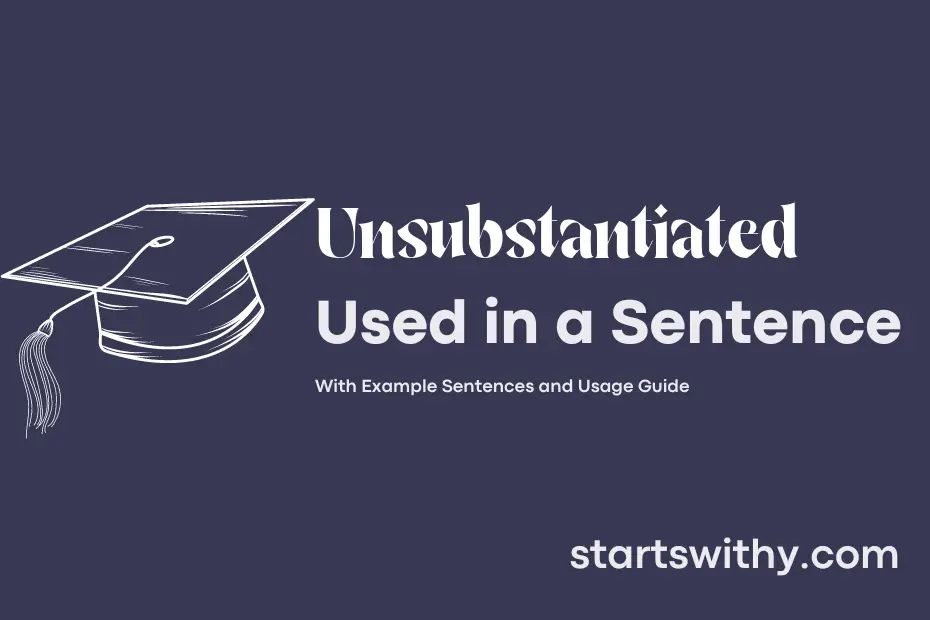Have you ever come across a statement or claim that lacked evidence or credible support? That’s called an “unsubstantiated” assertion. In simple terms, it means a statement that is made without proof or supporting facts.
When an assertion is described as unsubstantiated, it essentially means it cannot be verified or proven to be true. This lack of evidence can cast doubt on the validity of the statement and its credibility. Let’s explore further how unsubstantiated claims can impact various aspects of communication and decision-making.
7 Examples Of Unsubstantiated Used In a Sentence For Kids
- The unsubstantiated rumor spread quickly in the school.
- We should only believe in things that are true, not unsubstantiated.
- Let’s not make decisions based on unsubstantiated information.
- It’s important to ask questions if something seems unsubstantiated.
- We should always verify facts before spreading unsubstantiated news.
- The teacher taught us to be cautious of unsubstantiated claims.
- It’s better to trust information that is proven, not unsubstantiated.
14 Sentences with Unsubstantiated Examples
- Unsubstantiated claims of plagiarism can tarnish a student’s academic reputation.
- It is important to back up your arguments with evidence and not rely on unsubstantiated statements in research papers.
- Students should be wary of spreading unsubstantiated rumors that can harm their peers’ reputations.
- Professors often encourage students to question unsubstantiated information and think critically about the sources they use.
- Engaging in debates based on unsubstantiated claims can hinder intellectual growth and lead to misinformation.
- Writing a thesis requires thorough research and avoiding unsubstantiated conclusions.
- As aspiring professionals, college students should refrain from making unsubstantiated promises in their job applications.
- The academic community values objective reasoning and rejects unsubstantiated theories.
- Falling for unsubstantiated rumors about campus events can lead to unnecessary panic among students.
- Scholars and researchers must prioritize factual evidence over unsubstantiated hypotheses.
- Exams are designed to test students’ knowledge and critical thinking skills, not their ability to make unsubstantiated guesses.
- Campus authorities take swift action against any form of unsubstantiated harassment or discrimination complaints.
- Students should approach controversial topics with caution and avoid spreading unsubstantiated information.
- The college’s academic integrity policy strictly prohibits the submission of unsubstantiated work.
How To Use Unsubstantiated in Sentences?
To use the word Unsubstantiated in a sentence, you can follow these simple steps:
-
Understand the meaning: The word Unsubstantiated means not proven with evidence or facts.
-
Identify a situation: Think about a claim or rumor that lacks proof, evidence, or support.
-
Construct the sentence: You can incorporate the word Unsubstantiated into your sentence by placing it in a context where something is being claimed without any evidence to back it up.
-
Example sentence: “The allegations of fraud against the company were unsubstantiated due to the lack of concrete evidence.”
-
Practice using the word: Try creating different sentences with the word Unsubstantiated to better understand how to incorporate it into your writing or speech.
-
Review and revise: Make sure that your sentence makes sense and accurately conveys the meaning of Unsubstantiated.
By following these easy steps, you can effectively incorporate Unsubstantiated into your vocabulary and communication. Practice using it in various contexts to become more comfortable with this word and enhance your language skills.
Conclusion
In conclusion, sentences with unsubstantiated claims lack evidence or proof to support their statements. Without credible sources or data to back up such assertions, they can mislead readers and undermine the credibility of the information presented. It is essential to ensure that the statements made in any writing are supported by reliable evidence to maintain accuracy and trustworthiness.
By scrutinizing and verifying the claims made in sentences, we can uphold the integrity of our writing and avoid spreading misinformation. Writers should always strive to provide substantiated evidence for their statements to enhance the clarity, credibility, and persuasiveness of their communication. Ensuring that sentences are backed by valid sources contributes to building a stronger foundation for compelling and reliable information.



